“War? Good actually. Empire? Double plus good. Racism? Hmm... let’s talk definitions...”: One day in the British media’s gaslight factory
There's no subtitle here, just a long and weary sigh.
“History is written by the victors” is one of those cliches that should probably lose students marks in A-level exams, because it simplifies the ugly editing process that history always undergoes to a quip.
The history of Britain and her brutal Empire is particularly littered with crossings out, ‘corrections’ and complete distortions designed to make white people on this cursèd island feel better about themselves. Deleting the ‘embarrassing bits has long been official policy.
From the early-1950s through to the 1970s, for instance, the British Colonial Office — which was subsumed into the Foreign Office in 1968 — ran Operation Legacy, a programme to destroy or hide files that might have come into the possession of newly-independent ex-colonies.

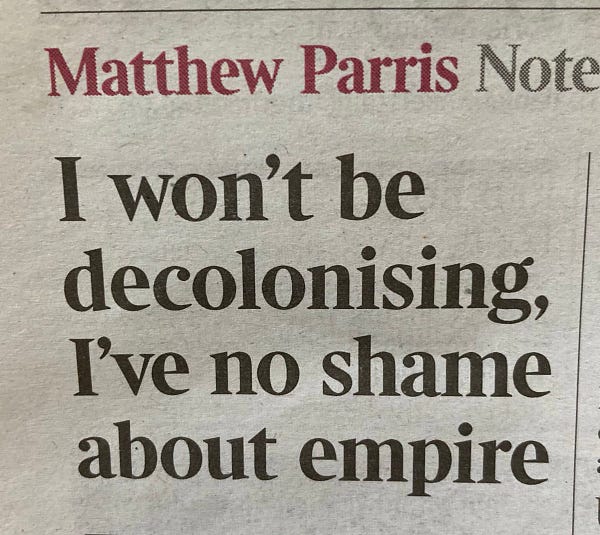
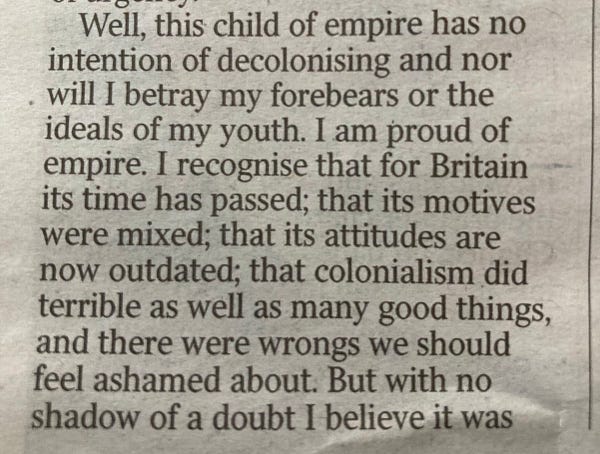
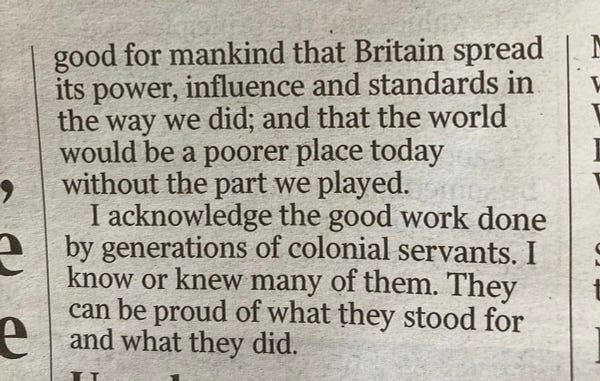
Under the guidance of agents from MI5 and Special Branch, civil servants burned, dumped and otherwise disposed of files that detailed the racist and violent policies of the British Empire — including brutal prison camps and the widespread torture of opponents.
More than 8,800 records were concealed from 23 countries and territories. The archives were either destroyed or sent back to the UK and the civil servants undertaking Operation Legacy were given extremely precise instructions on methods of destruction. The aim was to ensure that post-colonial governments did not become aware of the deception.
Reginald Maudling, the Colonial Secretary, wrote in 1961 that no post-independence government should have access to material which “might embarrass Her Majesty’s government.” While monarchy and government were engaged publicly in the creation of the great Commonwealth PR machine, the civil servants were behind the scenes burning the evidence of what empire really meant beyond her Maj, waving, smiling and patronising.
It took until 2011 for the UK government to admit that it was in possession of secret documents on the Mau Mau Uprising, and declassification only began in November 2013, with the publication o 20,000 files, which are now held at the National Archives in Kew.




The twin lies of Op Legacy and the Commonwealth’s creation have worked. The true horror of the British Empire is not talked about enough and when it is, the Right’s most prickly and preposterous voices pounce on historical critiques and cry that “history is being distorted” by “radical lefties”.
As I was writing yesterday’s edition — about the deliberate distortion in newspaper stories of a National Trust project that encouraged schoolchildren to write poems about artefacts from its collection — a copy of The Times was sitting on my desk waiting to be read. Inside, Matthew Parris had a piece proving once again how effective the official myth of the Empire was and remains.
Under the unambiguous headline, I won’t be decolonising, I’ve no shame about empire, Parris begins:
Rather suddenly, something people call “colonialism” has become the root of all evil. Monuments, statues, the National Trust, stately homes, Cambridge colleges, the school curriculum, even the BBC, are suddenly diagnosed as suffering from this distressing condition. If the gents at Derby station isn’t as clean as one might like, colonialism is probably to blame. We are instructed to decolonise as a matter of urgency.
This arrogant, ahistorical horseshit of the ripest and most ridiculous kind. The First International Congress against Imperialism and Colonialism convened in Brussels in 1927, so we’re hardly talking about a new conversation, though Parris’ crack about the “gents at Derby station” makes it clear it’s not one he’s willing to engage with in good faith.
Parris was born to British parents in Johannesburg in 1949. He was a child when the Empire was being dismantled and he seems to have retained a child’s view on what that bloody institution did. He continues:
I am proud of empire. I recognise that for Britain its time has passed; that its motives were mixed; that its attitudes are now outdated; that colonialism did terrible as well as many good things, and there were wrongs we should feel ashamed about. But… I believe it was good for mankind that Britain spread its power, influence and standards in the way we did; and that the world would be a poorer place today without the part we played.
Look at how he sweeps his hand across that history, knocking atrocities aside as if they were nothing, and talking blithely of how “the world would be a poorer place today without the part we played”. It’s impossible for him to imagine a scenario in which British military power had not forced its will onto a fifth of the world’s population, in which other nations thrived and survived without the course of their histories being steered by racist hands in London.
In his pitiful 6-word admission of “wrongs we should feel ashamed about”, Parris wraps up thousands of crimes.
They include the concentration camps of the Boer War — a British innovation! — in which 28,000 white people and 20,000 black people died, the Amritsar massacre where soldiers fired on peaceful protestors until their ammunition ran out, killing 1,000 and injuring another 1,100 in 10 minutes, the Mau Mau Uprising (1951 — 1960) during which members of the Kikuyu were held in camps where they were tortured, raped, and murdered, and the Bengal famine in which 4 million Bengalis died while millions of tons of food continued to be exported to Britain. Those are just some of the more famous atrocities.
Of those who destroyed evidence of those crimes, Parris writes
I acknowledge the good work done by generations of colonial servants. I know or knew many of them. They can be proud of what they stood for and what they did.
Some of his best friends are war crimes deniers.

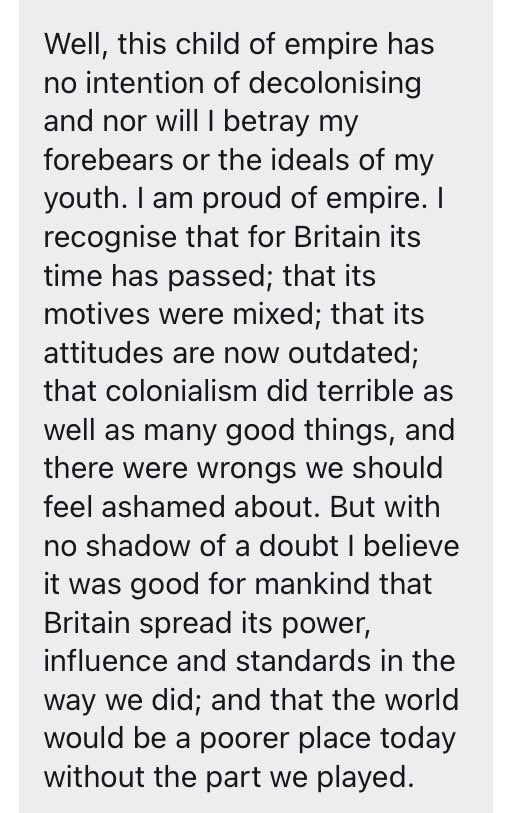
Parris’ propaganda shows the ongoing success of the British government effort to distort and deny the truth of the Empire. And that game was going on long before even Operation Legacy. In 2001, confidential letters written by Lord Milner, the officer given the job of ‘dealing with’ the Boer War concentration camps after the conditions in them were exposed in Britain, came to light.
In them, Milner suggests launching a publicity campaign to cover up the true conditions in the camps and using sympathetic statistics to shift the tide of public opinion. Milner wrote to his superiors:
It is impossible not to see that however blameless we may be in the matter, we shall not be able to make anybody think so, and I cannot avoid an uncomfortable feeling that there must be some way to make the thing a little less awfully bad if one could only think of it.
The process of playing down and hiding the horrors of the Empire has worked. It is continued by columnists like Parris and pressure groups like Restore Trust who attack anyone who dares to talk about the realities of British rule. In 2016, a widely-reported YouGov poll found that 44% of respondents were “proud of Britain’s history of colonialism” while only 21% regretted that it happened. 23% of those surveyed had no opinion either way.
Often when the Right wails about ‘lefties distorting our history’, what it actually means is that it doesn’t like its own distortions to be identified and analysed.


The collective British memory of World War II, for instance, comes less from history books than from annual Christmas repeats of The Great Escape, regular reshowings of The Longest Day, and the permanent presence of Dad’s Army on our screens. It’s why in the midst of the current pandemic so many columnists and commentators have reached for ‘Blitz spirit’ metaphors and talk of the ‘resilience of the war generations’.
But ‘Blitz Spirit’ is again just a very resilient piece of wartime propaganda that has continued to resonate all these years later — under the cover of the blackout crime, anger, hatred and fear festered. People had to carry on because they had no other option. It was a far cry from the “Keep calm and carry on” slogan, which never appeared during the war as people were so pissed off with early entries in the poster campaign, which said things like ‘Your Courage, Your Cheerfulness, Your Resolution; Will Bring Us Victory’. People wondered why it had to be their courage that brought victory.
As with the story of the Empire, the real history of the Second World War is messy, ugly, complicated, and bleak. It’s not surprising that people prefer to believe something that seems perfect like the milkman delivering in the rubble image (above) is real — it was a setup by Fred Morley to get his image past the censors — than to go searching through sharp shards of truth.
And the distortion and dissembling are not just for history; it happens every day in the newspapers in stories about things happening now.



I wrote last week about how the Sewell report on racism — which effectively denies the existence of institutional racism — is catnip for the Right, and the buffet of bad takes sparked by it is still being rolled out.
UnHerd published a piece by Tom Chivers yesterday with the seemingly mild headline 'Nobody will win the Culture Wars’. It engages in the most tedious footling around definitions of racism — quoting the dictionary and two other white thinkers on what racism is and isn’t — while its writer, a regular contributor to UnHerd which writes about little other than ‘culture war’ topics, affects to be above all that.
The Right has been rewriting and erasing history for a very long time. It’s also been working hard to change the meaning of words, attempting to disconnect them from the reality they are meant to describe. That they claim it is really the Left that is engaged in these projects is just another weapon in their culture war arsenal. But don’t worry about that — what if someone vandalises the Churchill statue and thereby destroys Britain forever?
This edition of the newsletter is dedicated to Ziggy. She was a very good dog.



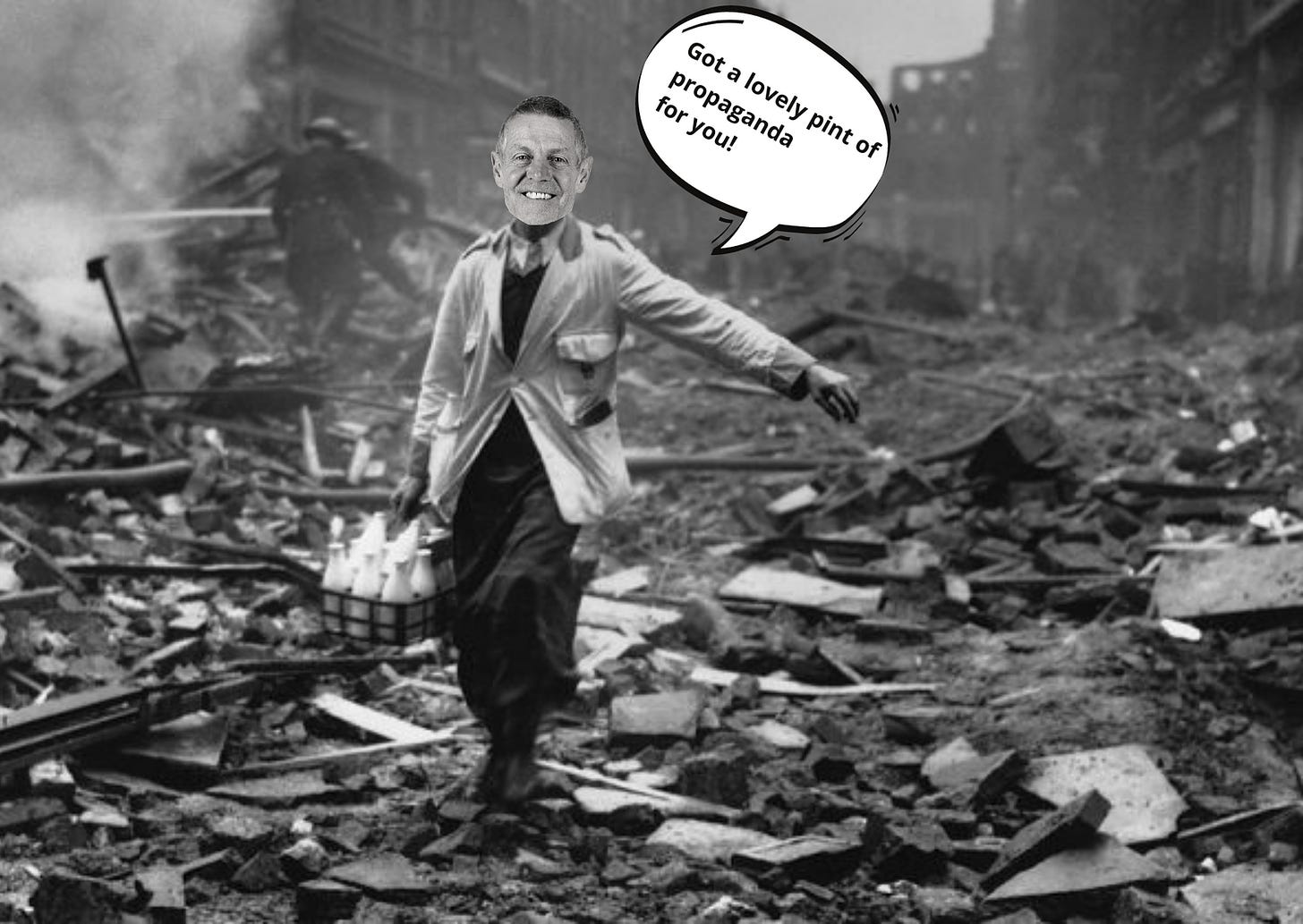
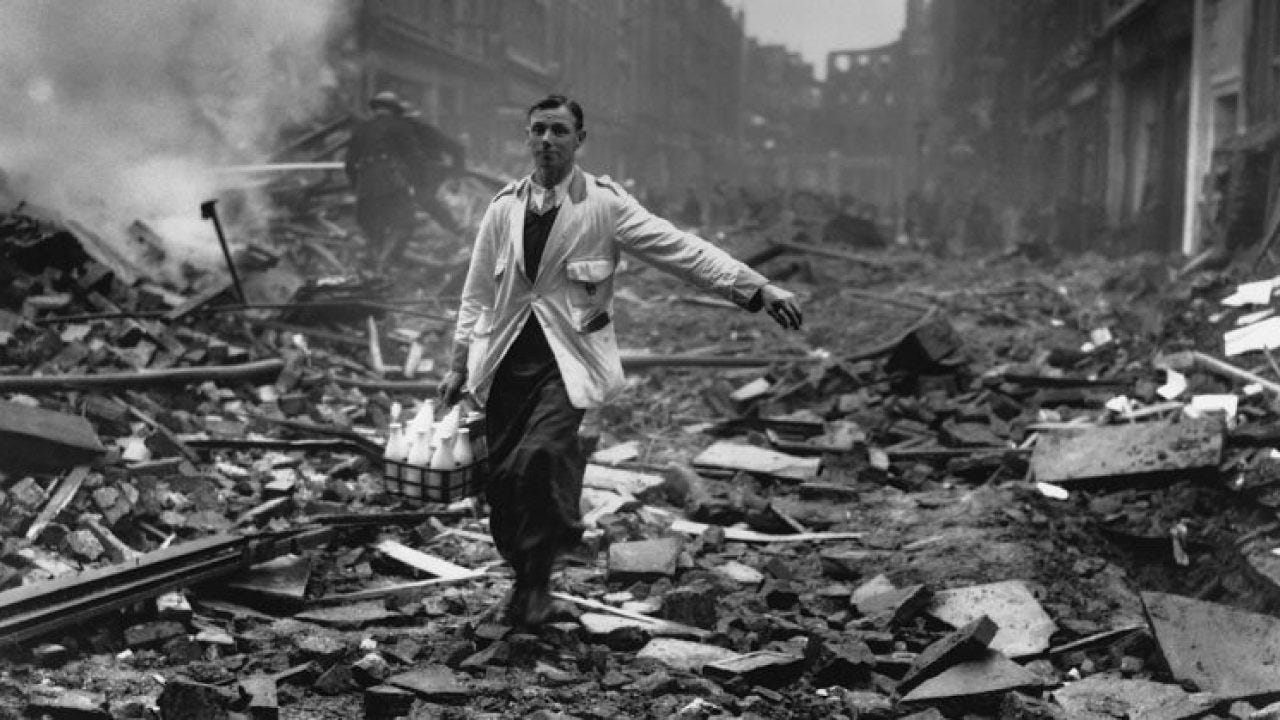



Great newsletter, as ever.